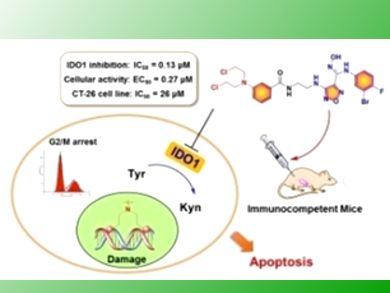Cancer immunotherapy uses the immune system to treat cancer. It is today used in cancer therapy as is surgery, radiation, chemotherapy, and targeted therapy. However, it is only effective for patients whose immunogenic tumor microenvironment can respond to activated immune cells. This is mainly because tumor cells can escape immune surveillance and suppress antitumor immunity.
Indoleamine 2,3-dioxygenase 1 (IDO1) catalyzes the first and rate-limiting step of the key pathway in immune escape. IDO1 inhibitors in combination with cytotoxic chemotherapeutic agents have been identified as an effective cure in cancer therapy. However, the simple combination of IDO1 with traditional cancer chemotherapies cannot overcome the severe side effects caused by these highly toxic compounds as well as possible drug–drug interactions. In addition, the different pharmacokinetics, biodistribution, and metabolism of two individual drugs make it difficult to achieve optimal therapeutic effects.
Wei Wan, East China University of Science and Technology, and Chunquan Sheng, School of Pharmacy, Second Military Medical University, both Shanghai, China, and colleagues have developed a single drug with a dual-targeting capacity to improve the efficacy of small-molecule cancer immunotherapy. The team designed hybrid molecules of IDO1 inhibitors and DNA-alkylating nitrogen mustards. They respectively target IDO1 and DNA. These compounds were found to have significantly higher anticancer activity in vitro and in vivo with low toxicity.
According to the researchers, this proof-of-concept study marks a critical step toward the development of a novel and effective immunotherapy for the treatment of cancers.
- Improving the Potency of Cancer Immunotherapy by Dual Targeting of IDO1 and DNA,
Kun Fang, Guoqiang Dong, Hongyu Wang, Shipeng He, Shanchao Wu, Wei Wang, Chunquan Sheng,
ChemMedChem 2017.
https://doi.org/10.1002/cmdc.201700666




